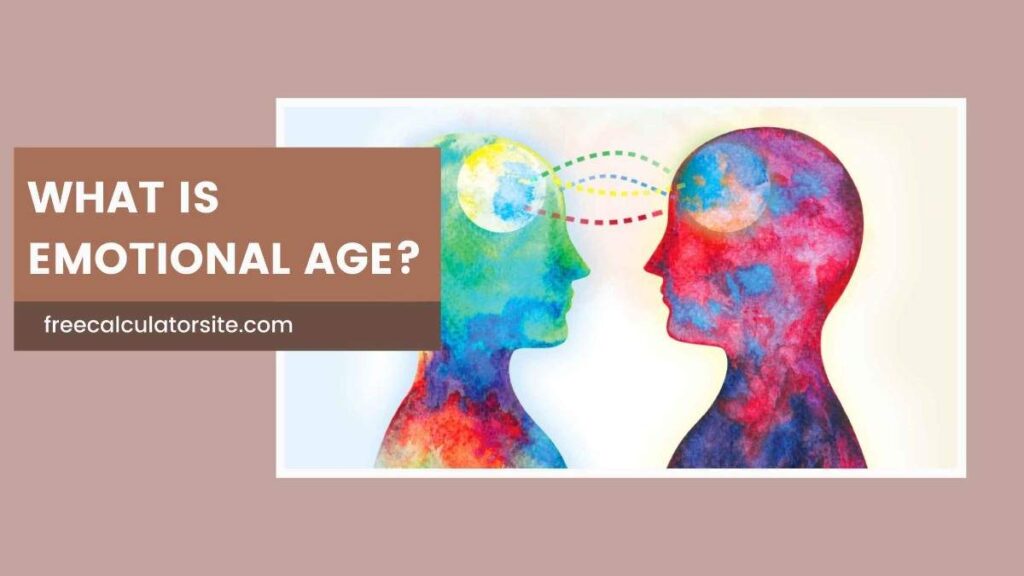Last updated on October 10th, 2024 at 07:27 pm

When we think of age, most of us tend to focus on the number of years we’ve been alive—our chronological age.
However, this is just one aspect of who we are.
While our physical age tells us how long we’ve existed, our emotional age reveals how mature and developed we are in handling our emotions, relationships, and the challenges that life throws our way.
But what exactly is emotional age, and why is it so important?
In simple terms, emotional age is a measure of our emotional maturity and our ability to understand, manage, and respond to our feelings and those of others.
It isn’t tied to how many birthdays we’ve celebrated but rather to how well we can navigate the emotional landscapes of our lives.
Let’s dive deeper into this fascinating concept and explore why it matters in our everyday lives.
Understanding Emotional Age
Emotional age can be thought of as the ‘age of the heart.’
It reflects how well we cope with emotions such as happiness, sadness, anger, fear, and love.
While some people may be emotionally mature beyond their years, others might find themselves struggling with emotional regulation despite being older.
This concept helps explain why some teenagers display remarkable empathy and understanding, while some adults seem stuck in childish tantrums or insecurities.
Also Read: Types of Ages in a Human
Factors Influencing Emotional Age
Several factors can influence emotional age, and they include:
- Life Experiences: People who have faced significant challenges or responsibilities early in life often develop a higher emotional age. For instance, someone who had to care for a sick parent as a child might exhibit greater emotional maturity than their peers.
- Family Environment: The emotional climate of a family can significantly impact emotional growth. If a child grows up in a household that encourages emotional expression and open communication, they’re more likely to develop a healthy emotional age.
- Education and Self-Awareness: Learning about emotions and developing self-awareness play a crucial role in emotional development. People who actively work on understanding themselves and their reactions often have a higher emotional age.
- Social Interactions: Engaging with different people, especially those from diverse backgrounds, can contribute to emotional maturity. Exposure to various perspectives allows individuals to develop empathy and a broader understanding of emotions.
Signs of Emotional Maturity
Understanding your emotional age can be a revealing journey.
Here are some common signs that indicate a higher emotional age:
- Empathy: You can put yourself in others’ shoes and understand their feelings. You don’t just sympathize; you genuinely empathize.
- Healthy Boundaries: You know where to draw the line in relationships, whether personal or professional, and you’re not afraid to enforce these boundaries.
- Self-Regulation: You can manage your emotions, even in difficult situations, without resorting to impulsive reactions. When something upsets you, you take a step back, process your feelings, and respond appropriately.
- Open-Mindedness: You welcome different viewpoints and are willing to adjust your beliefs when presented with new information.
- Accountability: You take responsibility for your actions, admit when you’re wrong, and learn from your mistakes.
- Resilience: You bounce back from setbacks and don’t dwell on failures. Instead, you view challenges as opportunities for growth.
See Also: What is Mental Age?
Signs of Emotional Immaturity
Conversely, if someone exhibits emotional immaturity, their emotional age might be lower than their chronological age.
Here are some indicators:
- Impulsivity: Reacting without thinking and acting out in emotional situations without considering consequences.
- Victim Mentality: Constantly blaming others for one’s own problems and refusing to take responsibility for one’s actions.
- Difficulty with Boundaries: Being either too dependent or too detached in relationships and struggling to maintain healthy interactions.
- Inability to Handle Criticism: Taking constructive criticism as a personal attack and responding defensively.
- Emotional Outbursts: Frequently resorting to tantrums, sulking, or passive-aggressive behavior when things don’t go their way.
How to Assess Your Emotional Age
Assessing your emotional age involves introspection and a willingness to be honest with yourself.
Consider the following questions:
- How do I react when things don’t go as planned?
- Can I handle criticism without becoming defensive?
- Do I take responsibility for my actions, or do I often blame others?
- How well do I understand and manage my emotions?
- Am I able to empathize with others, even when their views differ from mine?
Answering these questions can help you gauge where you stand on the emotional maturity scale.
The Importance of Emotional Age
Emotional age plays a critical role in various aspects of life:
- Relationships: Emotionally mature individuals tend to build healthier, more fulfilling relationships. They’re better equipped to handle conflicts, communicate effectively, and understand their partner’s needs.
- Career Growth: Emotional maturity is highly valued in the workplace. It enhances leadership abilities, teamwork, and conflict resolution skills, making emotionally mature individuals more likely to excel in their careers.
- Mental Health: A higher emotional age often correlates with better mental health. It allows individuals to cope with stress, anxiety, and other emotional challenges more effectively, leading to a more balanced and content life.
- Personal Growth: Understanding your emotional age can be a powerful tool for personal development. It highlights areas where you need to grow and provides a roadmap for achieving emotional balance.
Tips for Improving Emotional Age
If you find that your emotional age could use some development, don’t worry—emotional growth is a lifelong journey.
Here are some strategies to help you mature emotionally:
- Practice Self-Awareness: Take time to reflect on your feelings, thoughts, and behaviors. Understanding your emotional triggers is the first step to managing them effectively.
- Cultivate Empathy: Make a conscious effort to understand the feelings and perspectives of others. Engage in active listening, and put yourself in their shoes.
- Develop Emotional Regulation Skills: Learn to manage your emotions, especially in stressful situations. Techniques such as deep breathing, mindfulness, and journaling can be incredibly helpful.
- Seek Feedback: Don’t shy away from constructive criticism. Use it as an opportunity to grow and improve.
- Work on Communication Skills: Practice expressing your feelings and needs in a clear, assertive, and respectful manner. Good communication is a hallmark of emotional maturity.
- Build Resilience: Learn to adapt to life’s ups and downs with a positive mindset. Accept that setbacks are part of life, and use them as stepping stones for growth.
Conclusion
Emotional age is a profound aspect of who we are, often more important than our physical age.
It defines how we relate to ourselves and others, how we handle challenges, and how we navigate the complex emotional landscapes of our lives.
By understanding and working on your emotional age, you not only enrich your life but also create more fulfilling relationships, enhance your career, and develop a deeper sense of self-awareness.
So, next time you think about age, remember: it’s not just about the years you’ve lived but how emotionally mature and resilient you have become along the way.
After all, age is just a number, but emotional maturity is a choice.

Sayantika Karmakar provides expert insights on financial calculators in her blog posts.
